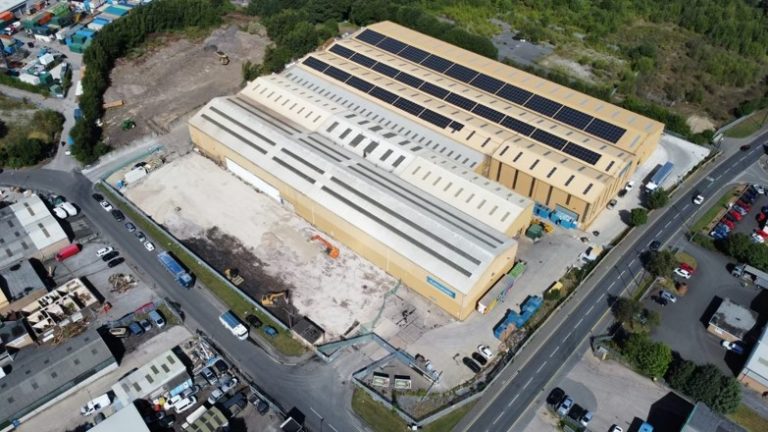Wednesday, November 5, 2025
Global Brands, the independent drinks company and distributor, are increasing their distribution capabilities with significant expansion to their warehouse facilities in Clay Cross, Derbyshire.
The current Global Brands Distribution Centre has 152,000 sq ft of warehouse space, employing 80 members of staff. This expansion will increase the warehouse size to 180,800 sq ft, and add 30 members of staff to the production and distribution line at the facilities. The expansion will increase total storage capabilities at the warehouse from 30 million to 40 million bottles, across 17,000 pallets.
Following extensive groundworks, the steel frame is being erected over the next two months, and a concrete slab base will then be poured and set. Works for the 28,800 sq ft extension will conclude in January 2023.
The expansion follows a sustained increase in demand versus 2019 (the last year of undisrupted trading) for the company’s portfolio of drinks brands, including VK, Hooch, Franklin & Sons, All Shook Up, Shake Baby Shake, Beviamo, Kick Energy, Lustre, and Amigos Tequila Beer.
Steve Perez, founder and chairman at Global Brands, said: “I’m thrilled to announce the expansion of our distribution facilities in Clay Cross, following a sustained increase in demand nationally and huge demand internationally for our key growth brands like Franklin & Sons. The new extension will support our growing operations with additional storage and increased distribution capabilities.
“This is just the first phase in work to continue increasing capabilities at the site over the next two years. We plan to continue investing in our Global Brands Distribution Centre to the point where we can eventually hold one product for every person in the UK.”
Alongside the current construction, Global Brands has recently purchased an adjacent piece of land for further investment into the area and facilities. The acquisition was brokered by BRM Solicitors.
Adrian Sheehan executive director at BRM Solicitors, said: “It is always rewarding to advise on a deal which will bring further development opportunities and employment to the region.
“BRM are proud to stand to shoulder to shoulder with this long-standing client and Chesterfield success story.
“It is great to see Global Brands go from strength to strength and highlights a commitment to Chesterfield.
“The Real Estate team at BRM are delighted to advise Steve and the team at Global, who are always driven and enthusiastic to get deals done quickly and efficiently.”
Steve Perez adds: “BRM have advised Global Brands for the past 35 years, from when the business was just a one-man band, through to becoming one of the largest employers in the area. This is a credit to the expertise that BRM and Adrian Sheehan offer and cater to a variety of business needs.”
A Market Harborough business park is now under new ownership following a deal for an undisclosed sum.
On behalf of Patoro Properties, Chartered Surveyors and Property Consultants, Wells McFarlane has completed the acquisition of Bowden Business Village, just two miles north of the town centre, which comprises over 8,000 sq ft of office space in three converted barn buildings.
“This unique business venue has been a sought-after destination for the past two decades, attracting tenants seeking an edge of town, easily accessible yet semi-rural premises,” explains Wells McFarlane’s director, Jason Hercock. “The vision of the original owner, Jon Fox to create self-contained buildings around a central hub to encourage interaction and establish a new community has driven the success of Bowden Business Village, and is one of the reasons it made an attractive property investment.
“The deal with Patoro Properties was concluded off market and highlights the result of working with a commercial property agency with strong local connections. We encourage investors seeking to start or increase a property portfolio to contact us for a confidential conversation.”
Following completion of the acquisition, Wells McFarlane has also been instructed as managing agents for Bowden Business Village, including all property management, agency and lease advisory services.
Jason added: “We’ll be working closely with Jon Fox and his team to handover the management, and Jon will continue to run his development business from the Village so existing tenants can be assured of a smooth transition and familiar faces going forward. Around the grounds, Patoro Properties plan to install new EV charging points, entrance gate, cycle rack and additional landscaping, ensuring Bowden Business Village remains an appealing and sustainable workplace.”
Business owner Luke Tobin, founder of Oadby-based marketing agency Digital Ethos, is celebrating after South American-based company Cadastra has acquired the firm in a deal worth approximately £8 million.
Luke founded the company in 2016 with just £100 invested and progressed his way up the ladder to be named ‘Great British Entrepreneur of the Year 2020’. Luke also joined Richard Branson’s Virgin StartUp scheme to mentor like-minded entrepreneurs starting their own businesses.
Digital Ethos was also named ‘The UK’s fastest Growing Agency’ in 2019 and was recently granted B-Corporation status for its sustainability-conscious practices including pledging to plant 50,000 trees in 2022.
The acquisition by Cadastra, a digital marketing, consultancy and technology company with offices across Europe and South America, will mean that Digital Ethos will establish itself further with an array of international clients and with Luke still at the helm as CEO.
Speaking on the acquisition, Luke said: “It’s absolutely amazing to be in this position just a few years on from when I founded the company from nothing. We’re thrilled to have been acquired by an established company and are very excited as to what the future holds for us.
“Digital Ethos was chosen for the acquisition due to our scale of growth in a very short time, so it’s certainly a cause for celebration not only for me personally but for my whole team.”
In addition to Digital Ethos, Luke is also founder of rapid growth investor brand Tobin Capital, specialising in minority stakes in private organisations, which he will be continuing to develop alongside Digital Ethos’ merger.
Digital Ethos specialises in digital marketing services such as SEO, PR, Social Media and Web Development. Its list of clients includes the NHS, Scrivens and M&S Opticians and the merger with Cadastra means the business will be expanding to 15 countries with more than 700 employees worldwide.
Work has officially started on a new homes and office development in Mountsorrel, Leicestershire.
The mixed-use site will bring nine properties and two commercial offices to the area, which will be marketed by Newtown Living.
Chartered quantity surveyor and project management experts Addison Hunt has been appointed to provide project management and quantity surveying services and will work alongside property development and construction company GS Developments, and architects rg+p, to deliver the project.
Simon Collin, director of Addison Hunt, said: “We’re delighted to have been appointed to work on this project. The development of the site will provide a much more positive outlook and sense of arrival as passers-by travel through Mountsorrel.
“We look forward to work progressing and bringing a new mixed-use development to the area, which has been designed to fit in with the current surroundings.”
Granite Way continues the relationship between the firms, with recent Leicestershire project completions on a warehouse development at Parker Drive and affordable housing scheme at Abbey Meadows.
Mandeep Singh, director of GS Developments, said: “It’s great to be working alongside Addison Hunt to deliver another fantastic project in the Leicestershire area.
“After a number of years of planning and design work we’re delighted to finally see the build get underway, which will enhance and bring more people to the site to live and work.”
Neeley Turrell, estates manager at Newtown Living, said: “We’re looking forward to the homes being complete and providing residents with new rental properties, given the current demand for high-quality homes in Leicestershire.”
Property developer Godwin Developments, which has offices in Nottingham, Birmingham and central London, has launched a nationwide build-to-rent (BTR) platform.
Working as an equity investor in partnership alongside a leading institutional real estate partner, Godwin has ambitious plans to build a portfolio valued in excess of £1 billion.
The joint venture (JV) will target both the single-family and multifamily BTR sectors in recognition of the substantial growth potential of the asset class. The strategy enables Godwin Developments to leverage its strong track record across acquisition, planning and delivery whilst rapidly scaling its operations in the sector. The JV partner has significant experience in investing in the living sectors across multiple jurisdictions, including in the UK.
In the near-term, the JV partnership is aiming to develop its BTR proposition through the acquisition of both standing and forward funded stock as well as by unlocking new land opportunities. The Oxford-Cambridge Arc and the Home Counties will be key to expanding the delivery of single-family units for rent, and London, Bristol and Birmingham will be important target cities for the multifamily offering.
The JV will focus on creating high-quality, professionally managed homes with strong ESG credentials that will appeal to residents of all ages and life stages – from singles and sharers, to couples, families, and downsizers.
Research by the British Property Federation and Savills published last month estimated the BTR sector to be worth £170 billion by 2032, with completed BTR homes projected to increase fivefold over the next decade.
Stephen Pratt, director and co-founder at Godwin Developments, said: “We are thrilled to announce the next step in our growth ambitions in the BTR sector. BTR has proven itself to be a highly defensive asset class and is rapidly establishing itself as a real alternative to home ownership, delivering an opportunity to alleviate the shortage of housing across the country.
“This launch is truly transformational for our business, and we look forward to growing our portfolio nationwide, adding value for residents, housebuilders, landowners, local authorities and other stakeholders using our expertise and unique ability to deliver, market and manage schemes across the development lifecycle.”
Godwin Developments was advised by Alantra (corporate finance), Gateley (legal) and KPMG (tax).
A Loughborough-based transport solutions company has made a substantial investment in new buses after landing a funding deal through Nottinghamshire’s Affinity Asset Finance.
Vectare has enhanced its environmental credentials by acquiring ten Alexander Dennis Enviro E200 low carbon emission buses after securing a £2m deal arranged by Affinity, which used its expertise and broad funding panel to deliver the funding package.
Neil Kimberley, director at Affinity Asset Finance, said: “It’s been a pleasure to work with Vectare on this deal – and it’s great to see such a forward-thinking transport company investing in its business in this way.
“Since Affinity was set up almost 14 years ago we have been able to put together a panel of Tier 1 asset funders outside of the mainstream High Street banks who are moving away from this kind of funding.
“We believe in backing progressive companies and we wish Vectare all the best for the future.”
Vectare is a nationwide transport provider and will utilise its new fleet to deliver transport services for additional council contracts the company has won across the UK.
With pressure and demand for council transport services, Vectare is positioned well to continue to win and deliver contracts across the UK.
Dominic Kalantary from Vectare said: “We are a growing business providing high quality local bus services throughout the UK and where we can we always strive to be as climate friendly as we can be. That means upgrading and acquiring fleet stock that is as modern as possible.
“The Enviro200 is Britain’s favourite single deck bus with a lightweight design that makes it highly fuel efficient and cost-effective to run. Sourcing funding for these acquisitions is notoriously challenging but Neil and the team at Affinity made the whole process as seamless and as swift as possible. This in turn will enable us to fulfil an ever-growing portfolio of contracts across the UK in as an efficient and climate friendly manner as possible.”
Accountancy and business advisory firm BDO LLP has strengthened its Midlands team with the senior appointment of Chris Rowe as VAT partner, following a raft of promotions across the region earlier this month.
Chris joins the Midlands Tax team and brings over 13 years’ experience to the position. In his previous role as director at EY, he led the automotive team nationally for Indirect Tax, and was also Tax lead on a number of key accounts. Chris also brings sector expertise across retail and manufacturing.
At BDO, Chris will be responsible for helping to build the Midlands VAT team, both in terms of people and revenues. He will also utilise his sector expertise by adding value to the firm’s Midlands manufacturing hub, while working nationally in the automotive market.
Kyla Bellingall, Midlands Managing Partner, said: “We’re delighted to welcome someone of Chris’ experience to the Midlands team, in what is an excellent hire for both our VAT and sector teams, as we look to solidify our presence in the regional market over the coming months and years.
“Having the right people in place to drive those ambitions, while supporting Midlands businesses in the notoriously complex areas of VAT and Indirect Tax, is absolutely vital. His arrival comes at an exciting time for the firm regionally, after 97 promotions in the Midlands across core areas of our business, including audit, tax and advisory.”
Chris said: “I’m really excited to get started at BDO. The culture within the business is fantastic and truly encourages collaboration, not only within specialist teams, but across the various sector disciplines, both regionally and nationally.
“The opportunity to build what is already a strong VAT team, as we look to capitalise on the significant market potential, is very exciting and I’m delighted to be playing a key role in realising those ambitions in the Midlands.”
Earlier this month, BDO promoted 97 people across its team in the Midlands, including three promotions to partner. The promotions follow a raft of appointments, including John Rouse who was appointed as partner in the FAVS team, and a duo of director hires in the Business Services & Outsourcing practice.
Do you own a commercial property that is currently undergoing or about to undergo construction and renovations? Keeping your property in tip-top condition is one thing, but sometimes it needs more than cosmetic touches and a more in-depth project is warranted.
The problem is that a construction project on a commercial property isn’t always quick and easy, and can’t be compared to home renovations. This is why it’s important to have the right people on the job.
Here we’ll take a look at what to consider when hiring additional support for a construction project.
Lloyds Banking Group has appointed Andrew Asaam as its new group ambassador for the Midlands.
Alongside a team of experts from across the group, Andrew will work with local politicians, regional business leaders, community networks and charities to help address the challenges facing the Midlands.
There will be a strong focus on exploring ways of helping people in the region access affordable and sustainable housing. Andrew will also champion small businesses and promote the importance of skills and apprenticeships, as well as advise on the Midlands’ transition to a low-carbon economy.
Andrew, who is homes director for Lloyds Banking Group, was born and raised in Birmingham and studied economics at Coventry University.
He said: “As a proud Midlander, I’m really honoured to have been asked to take on this role because our region has so much to be shouting about.
“We have a long history of innovation which continues today – not least in our advanced manufacturing technology and health and life sciences sectors – and we’re also building on our strong automotive heritage, as electric vehicles and Birmingham’s clean air zone push us forward on the road to net zero.
“The Midlands’ place in the heart of England makes it central to the success of the UK. I’m really looking forward to working with other leaders in the region to help bolster growth and attract investment.”
The ‘loft-style’ fourth floor office at the popular 34 Stoney Street has been let in a deal brokered by Thomas Szymkiw, office agent at FHP Property Consultants.
The 1,400 sq ft suite provides Budgeting Solutions an opportunity to acquire a fully refurbished space within the roof eaves of this historic Grade II former Lace Mill.
The refurbishment included a full strip out with the installation of LED lighting, heating and cooling system, brand new kitchenette, WC’s and some clever glass partition work between the roof trusses to create independent meeting spaces.
Thomas Szymkiw, associate director at FHP, said: “This letting completes the final piece of the jigsaw for our clients who from acquisition of the property have undertaken a full and substantial refurbishment – sympathetically looking after its historic and period features whilst modernising the internal suites to the new tenants’ exacting specifications.
“It just goes to show that in the current market occupiers are demanding quality and when this is delivered – fantastic results will follow.
“It’s great news for the Lace Market office scene to have this building now fully let and I wish Paul at Budgeting Solutions and all the tenants the best of luck for the future.”
Paul Bavington, of Budgeting Solutions, said: “It’s been great working with Thomas/FHP on structuring the right deal with the landlord and being involved in specifying the fit out to ensure we created a workspace designed for hybrid working.
“As a fast growing technology business, this space will enable colleagues and clients alike to embrace true digital working patterns.”












